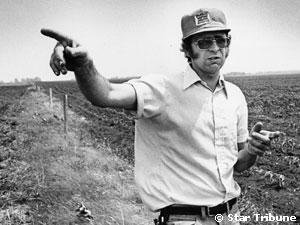Citizen Resistance
December 9, 2002
 |
| Prosecutors alleged that Virgil Fuchs drove his tractor over the surveyors' equipment, then rammed the back of their pickup truck. (Photo courtesy of Star Tribune) |
Undated — Prosecutors alleged he drove his tractor over the surveyors' equipment, then rammed the back of their pickup truck. Soon, people were gathering at other farms, including Alice and John Tripp's.
"The surveyors came onto County Road 14, which goes past our farm," Alice Tripp remembers. "So we started taking a stand there. They tried to stand in front of the surveyors, tried to stop the surveyors, and some people said, 'We don't want this; you have to get out of here.'"
"These are not protesters, not hippies, they've never broken law in any way. Hardly any of them even had traffic tickets. It was just an affront. Coming on their own yard, they wouldn't listen. John, tell the lady why people reacted the way they did. Why did they get so angry?" wonders Alice Tripp.
"I would say, we thought they weren't very decent about the way they went about it," John says. "(It) seemed like they were going to take our land, that was it, and we had nothing to say about it. That was the big item to a lot of people. And we were kind of afraid about it, we'd heard from people out west that they have a line like this that wasn't very pleasant, and it isn't either. If you ever go out under it when it's on, you'll see. It's been described as being in a frying pan. And it is just like that; it hisses and crackles all around you. It's just like you are being fried."
"In Pope County, in this county, up at Glenwood and north at Lowry in fact, that was the most dramatic place, because they were very innovative," remembers Alice. "The surveyors would come through and they would find there was a ditch dug across the road. The farmers got permission to do that; they said they had to fix a bridge or something, and they dug a ditch right across the road. And another time when the surveyors came, Scott Jenks started up his chain saw, so they couldn't talk."
Local authorities found themselves in a tight spot. On the one side stood crowds of their friends and neighbors, the citizens who elect county sheriffs to office. On the other side stood workers for far-distant power companies, backed by an equally distant state agency.
Stearns County Sheriff Jim Ellering wanted no part of it. He spoke to reporters in June 1976.
"As sheriff of this county, I became involved when the landowners and other concerned citizens objected to trespasses of their property. In the meantime the power companies expect my department to use unlimited force, if necessary, to accomplish their survey and ultimately the routing of the powerline. In my opinion this is a situation that began with the Environmental Quality Council, at the request of the power companies, and that's where the problem should be remanded for resolution. I will not point a gun at either the farmer or a surveyor. To point a gun is to be prepared to shoot, and this situation certainly does not justify either. It does justify a review of the conditions that bring about such citizen resistance," he said.
Meeker County Sheriff John Rogers was just as reluctant. He spoke to an MPR reporter that fall.
"I am going to the governor and let him make the decision. It isn't a county matter anymore when you've got six counties involved. And I think it's about the time the governor gets involved in this here, because it's more than what we can handle. If this comes up again, why, we just can't handle it, that's all there is to it."
Gov. Wendell Anderson declined to intervene. But when the fall of 1976 turned to winter, a new governor took office: a former Iron Range dentist named Rudy Perpich.
|
News Headlines
|
Related Subjects
|

